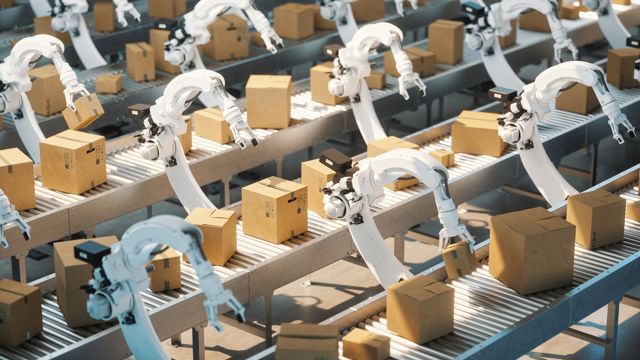Benefits of AI in Manufacturing
AI in Manufacturing
57% of manufacturing companies are piloting or experimenting with AI technologies, indicating a strong trend towards AI adoption in the manufacturing sector.

What is AI in Manufacturing?
Artificial Intelligence (AI) is a form of computer science dedicated to creating systems that can perform tasks typically requiring human intelligence, such as learning, reasoning, perception, and natural language processing.
By leveraging AI, manufacturers can significantly enhance their operations. AI in manufacturing enables predictive maintenance, reducing downtime by forecasting equipment failures. It improves quality control by detecting defects with greater accuracy and speed. Additionally, it optimises production processes, minimises waste, and enhances supply chain management by predicting demand and managing logistics efficiently.
How to approach AI in Manufacturing
AI empowers manufacturers to achieve higher efficiency, productivity, and adaptability in an increasingly competitive market. However, where should organisations begin?
- Identify High-Impact Areas: Start by pinpointing areas where AI can deliver the most value quickly. This helps in justifying the initial investment and demonstrating ROI early on.
- Pilot Projects: Launch small-scale pilot projects to test AI solutions. This allows you to assess their effectiveness and make necessary adjustments without committing significant resources upfront.
- Budget Allocation: Allocate a portion of your budget to AI initiatives gradually. You can do this by setting aside money from current budgets or getting more funds from successful pilot projects.
- Phased Implementation: Roll out AI solutions in phases, starting with the most critical areas. This phased approach helps in spreading out costs over time and reduces financial strain.
- Continuous Improvement: As AI systems improve over time, reinvest savings and gains from initial implementations into further AI development.
- Employee Training: Invest in training programs to upskill your workforce. This ensures that employees can effectively use AI tools, maximising the return on your investment.
By adopting an incremental approach, you can manage costs more effectively, reduce financial risks, and build your manufacturing AI capabilities.
The first step before implementing AI
70% of companies are not leveraging their data correctly for decision-making. Getting data right is crucial for manufacturers before implementing AI for several reasons:
- Accuracy and Reliability: AI algorithms rely on large datasets to learn and make predictions. If the data is inaccurate or inconsistent, the AI’s outputs will also be flawed, leading to poor decision-making.
- Efficiency: clean, well-organised data allows AI systems to process information more efficiently, reducing the time and computational power needed to generate insights.
- Bias Reduction: ensuring data is unbiased and representative helps prevent AI systems from making skewed or unfair decisions.
- Scalability: high-quality data is essential for scaling AI applications across different processes and departments within a manufacturing organisation.
- Compliance and Security: proper data management ensures compliance with regulations and enhances data security, protecting sensitive information from breaches.
By addressing these data challenges upfront, manufacturers can maximise the benefits of AI, such as improved operational efficiency, better quality control, and enhanced innovation.
- 1
Supply Chain Management:
Copilot can analyse supply chain data to predict potential disruptions, optimize inventory levels, and suggest efficient logistics routes.
- 2
Customer Service:
It assists customer service agents by drafting contextual responses to queries, providing real-time guidance, and summarising case histories to improve response times and customer satisfaction.
- 3
Sales and Marketing:
Copilot helps sales teams by summarising sales opportunities, generating email content, and providing updates on leads and account-related news. It also aids in creating compelling product descriptions and marketing texts.
- 4
Finance:
In Finance, Copilot can automate the reconciliation of bank statements, analyse financial data to forecast trends, and ensure compliance with industry regulations.
- 5
Human Resources:
AI optimises recruitment workflows, improves employee satisfaction through data-driven insights, and ensures compliance with HR policies and industry standards.
- 6
Project Management:
Copilot assists in tracking project progress, creating timelines, and allocating resources efficiently, ensuring projects stay on schedule and within budget.

7 Use Cases of AI in Manufacturing
Microsoft Copilot in Dynamics 365 Supply Chain Management and Finance is transforming the manufacturing industry by simplifying processes, reducing supply chain risk, improving financial forecasting, and increasing productivity.
Improve data quality in your manufacturing organisation
With HSO’s DnA Accelerator for Manufacturing, you will gain insights into inventory and stock-out rates. You will also learn about gross margin returns on inventory investment (GMROII) and more.
Understand how to manage your data fully, regardless of your transformation project.
Build a structured plan of your data and analytics landscape, identify the gaps, and learn how best to use your data assets.
For more information: DnA for Manufacturing
Read more
Manufacturing AI Content


